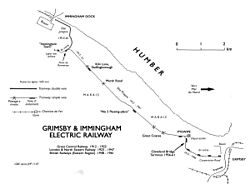Grimsby and Immingham Electric Railway

The Grimsby and Immingham Light Railway
|
|
| Locale | North East Lincolnshire England |
|---|---|
| Dates of operation | 1912–1961 |
| Successor | Abandoned |
| Track gauge | Standard |
| Length | 7 miles (11 km) |
| Headquarters | Grimsby |
The Grimsby & Immingham Electric Railway (G&IER) was an electric light railway, primarily for passenger traffic, linking Great Grimsby with the Port of Immingham in Lincolnshire, England. The line was built by the Great Central Railway (GCR), was absorbed by the London & North Eastern Railway (LNER) in 1923, and became part of the Eastern Region of British Railways. It ran predominately on reserved track.
The origin of the line lay in the decision of the Great Central Railway (GCR) to build a vast new docks complex on the marshlands of the south bank of the Humber near the small settlement of Immingham. The GCR reached agreement for the purchase of the land required and presented two Bills in Parliament of which the second was enacted as the Humber Commercial Railway and Dock Act 1904. A number of railways was authorised in connection with the construction and operation of the dock estate, comprising a new main-line railway approaching from Ulceby in the south (the Humber Commercial Railway); a branch from Goxhill in the west, facilitating services to and from New Holland and the Humber ferries (the Barton and Immingham Light Railway); and a direct link towards Grimsby (the Grimsby District Light Railway, GDLR, for which light railway powers were granted on 15 January 1906). Dock operation was labour-intensive and the GCR recognised that it would need to operate a passenger service to bring in dockers from neighbouring towns, principally the fishing port of Great Grimsby about seven miles east. The company also built a large locomotive depot at Immingham, which required workers’ transport. These enactments and considerations were the starting point of the G&IER.
To facilitate construction of the docks the GDLR was initially built from the Grimsby direction as a contractors’ railway and the GCR ran a steam-hauled workmen’s service on this from 3 January 1910. The GCR had two reasons for proposing an electric tramway in addition to this light railway. (Legally the G&IER would form part of the GDLR, although there was no physical connection between them). They had developed a major power generating plant at the Docks, which used electricity extensively for crane and lock operation. This could economically supply the tramway, and did so until 1957. Secondly they envisaged on-street operation in Grimsby itself, extending the area served and facilitating direct connexion with the existing Grimsby and Cleethorpes tramways. The GCR’s 1906 light railway order included a 1½ mile street tramway between Corporation Bridge and Cleveland Bridge in Grimsby, and a private right-of way alongside the existing GDLR between Cleveland Bridge and Immingham Dock.
...
Wikipedia
